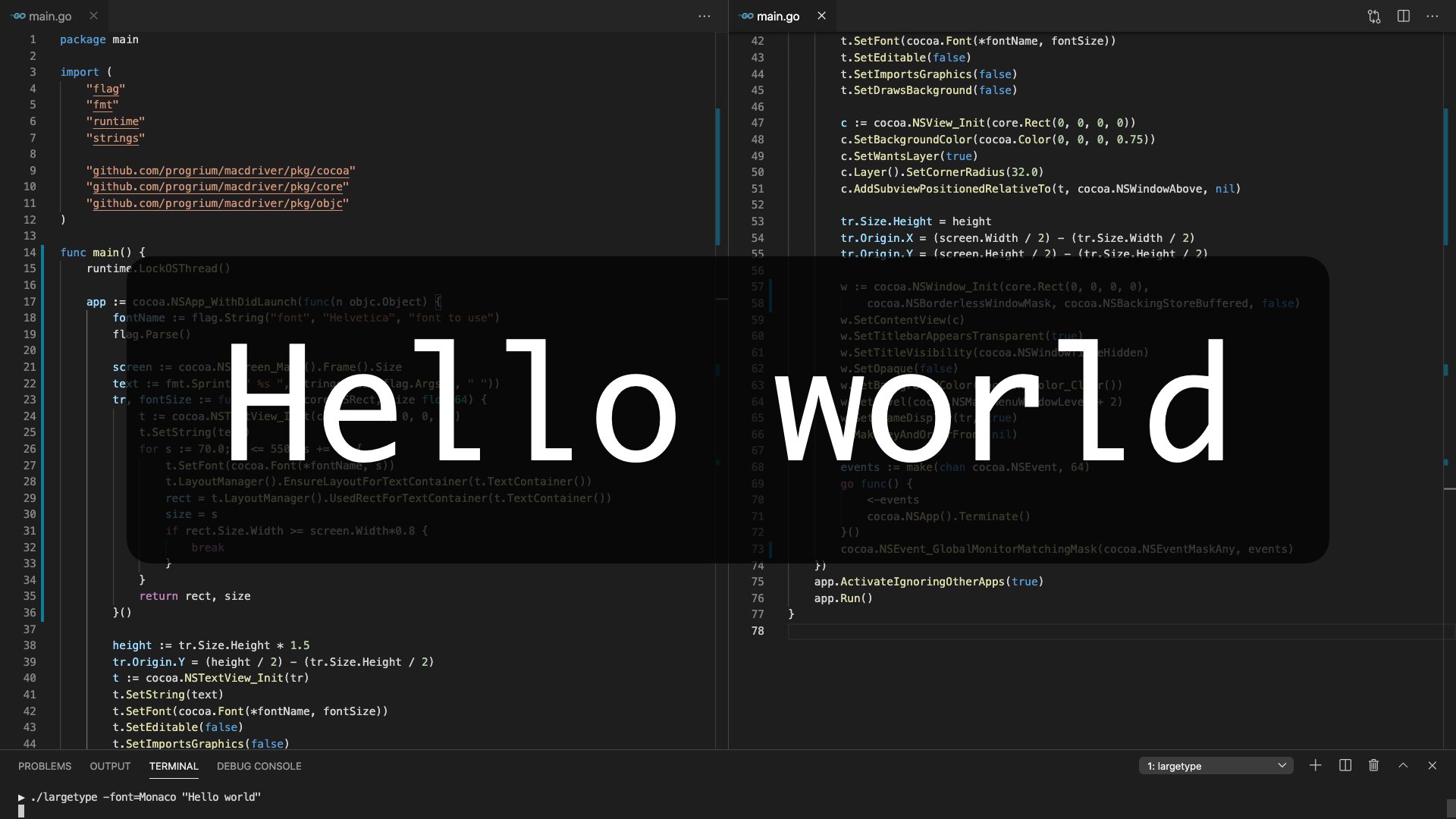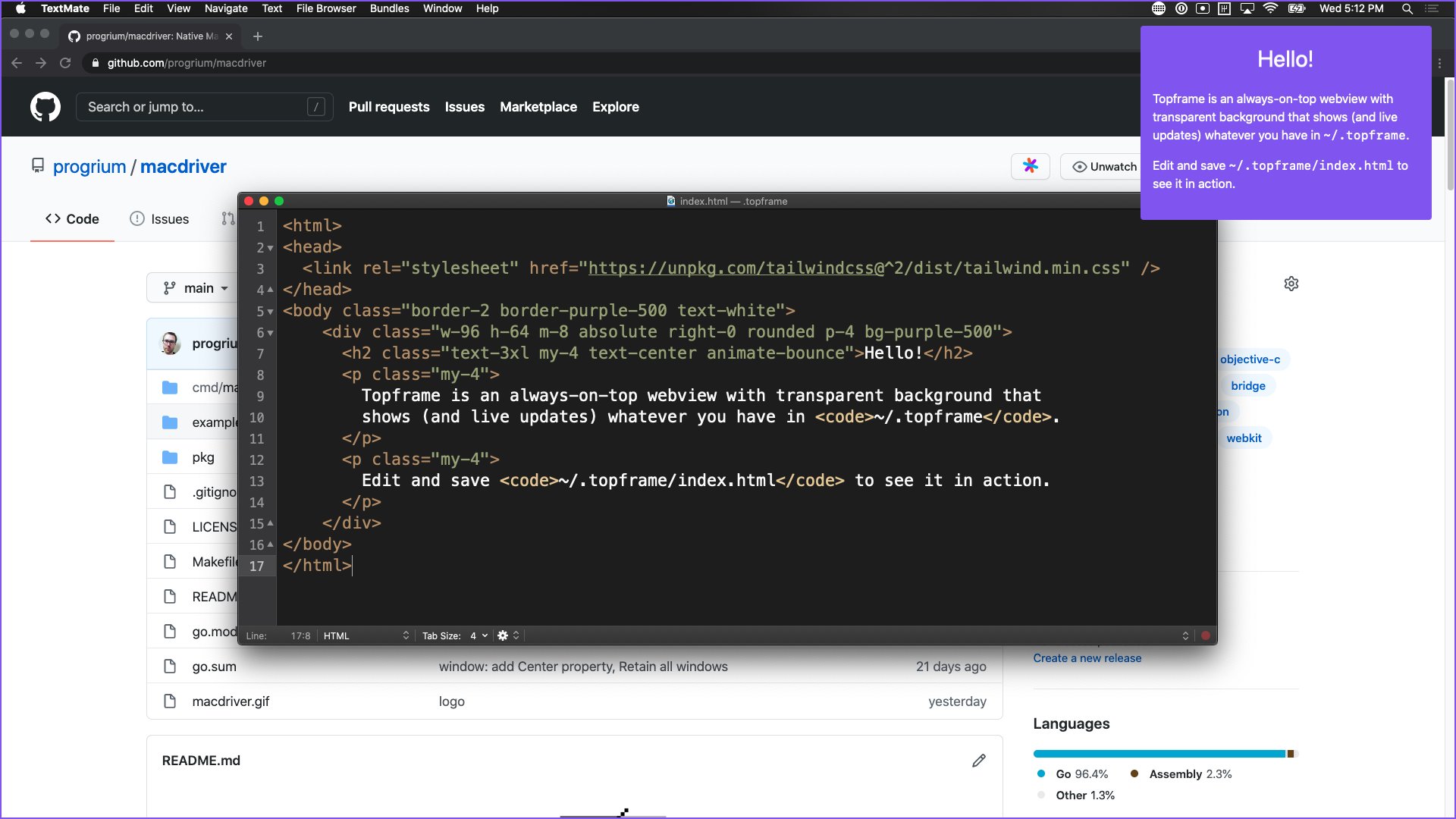
Native Mac APIs for Golang!




MacDriver is a toolkit for working with Apple/Mac APIs and frameworks in Go. It currently has 3 major "layers":
Bindings for Objective-C
The objc package wraps the Objective-C runtime to dynamically interact with Objective-C objects and classes:
cls := objc.NewClass("AppDelegate", "NSObject")
cls.AddMethod("applicationDidFinishLaunching:", func(app objc.Object) {
fmt.Println("Launched!")
})
objc.RegisterClass(cls)
delegate := objc.Get("AppDelegate").Alloc().Init()
app := objc.Get("NSApplication").Get("sharedApplication")
app.Set("delegate:", delegate)
app.Send("run")
- Access any class or method you can in Objective-C
- Method send common conveniences: Get, Set, Alloc, Init, ...
- Create and extend classes that can be used by Objective-C code
- Retain and Release methods for working with Objective-C garbage collection
Framework Packages
The cocoa, webkit, and core packages wrap objc with wrapper types for parts of the Apple/Mac APIs. They're being added to as needed by hand until
we can automate this process with schema data. These packages effectively let you use Apple APIs as if they were native Go libraries, letting
you write Mac applications (potentially also iOS, watchOS, etc) as Go applications:
func main() {
app := cocoa.NSApp_WithDidLaunch(func(notification objc.Object) {
config := webkit.WKWebViewConfiguration_New()
wv := webkit.WKWebView_Init(core.Rect(0, 0, 1440, 900), config)
url := core.URL("http://progrium.com")
req := core.NSURLRequest_Init(url)
wv.LoadRequest(req)
w := cocoa.NSWindow_Init(core.Rect(0, 0, 1440, 900),
cocoa.NSClosableWindowMask|
cocoa.NSTitledWindowMask,
cocoa.NSBackingStoreBuffered, false)
w.SetContentView(wv)
w.MakeKeyAndOrderFront(w)
w.Center()
})
app.SetActivationPolicy(cocoa.NSApplicationActivationPolicyRegular)
app.ActivateIgnoringOtherApps(true)
app.Run()
}
- 1:1 mapping of API names with Objective-C APIs
- Cocoa types: NSApplication, NSImage, NSMenu, NSWindow, more ...
- Webkit types: WKWebView and configuration classes
- Core types: NSData, NSDictionary, NSNumber, NSPoint, NSRect, NSSize, NSString, NSURL, more ...
- Core also allows dispatching Go functions in the Cocoa run loop
- Many constants/enums are defined
Examples
examples/largetype - A Contacts/Quicksilver-style Large Type utility in under 80 lines:

Note: topframe currently relies on embed which you can use with go 1.16beta
examples/topframe - A non-interactive, always-on-top webview with transparent background in 120 lines so you can draw on your
screen with HTML/JS:

Bridge System
Lastly, a common case for this toolkit is not just building full native apps, but integrating Go applications
with Mac systems, like windows, native menus, status icons (systray), etc.
One-off libraries for some of these exist, but besides often limiting what you can do,
they're also just not composable. They all want to own the main thread!
For this and other reasons, we often run the above kind of code in a separate process altogether from our
Go application. This might seem like a step backwards, but it is safer and more robust in a way.
The bridge package takes advantage of this situation to create a higher-level abstraction more aligned with a potential
cross-platform toolkit. You can declaratively describe and modify structs that can be copied to the bridge process and applied to the Objective-C
objects in a manner similar to configuration management:
package main
import (
"os"
"github.com/progrium/macdriver/bridge"
)
func main() {
// start a bridge subprocess
host := bridge.NewHost(os.Stderr)
go host.Run()
// create a window
window := bridge.Window{
Title: "My Title",
Size: bridge.Size{W: 480, H: 240},
Position: bridge.Point{X: 200, Y: 200},
Closable: true,
Minimizable: false,
Resizable: false,
Borderless: false,
AlwaysOnTop: true,
Background: &bridge.Color{R: 1, G: 1, B: 1, A: 0.5},
}
host.Sync(&window)
// change its title
window.Title = "My New Title"
host.Sync(&window)
// destroy the window
host.Release(&window)
}
This is the most WIP part of the project, but once developed further we can take this API and build a bridge
system with the same resources for Windows and Linux, making a cross-platform OS "driver". We'll see.
- Current bridge types available:
- Window
- StatusItem (systray)
- Menu
Development Notes
As far as we know, due to limitations of Go modules, we often need to add replace directives to our go.mod during development
to work against a local checkout of some dependency (like qtalk). However, these should not be versioned, so for now we encourage
you to use git update-index --skip-worktree go.mod on your checkout if you need to add replace directives. When updates need to
be checked in, git update-index --no-skip-worktree go.mod can be used to reverse this on your local repo to commit changes and then re-enable.
Generating wrappers
Eventually we can generate most of the wrapper APIs using bridgesupport and/or doc schemas. However, the number of APIs
is pretty ridiculous so there are lots of edge cases I wouldn't know how to automate yet. We can just continue to create them by hand
as needed until we have enough coverage/confidence to know how we'd generate wrappers.
Thanks
The original objc and variadic packages were written by Mikkel Krautz. The variadic package is some assembly magic to make everything possible since libobjc relies heavily on variadic function calls, which aren't possible out of the box in Cgo.
License
MIT
 Directories
¶
Directories
¶




